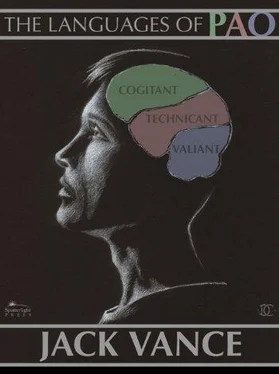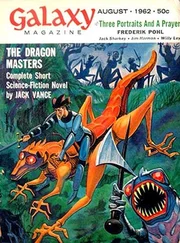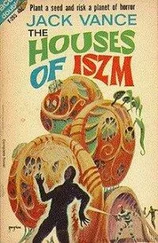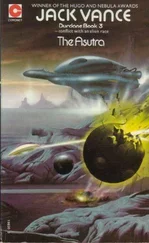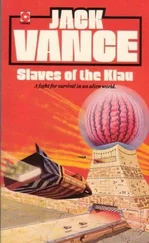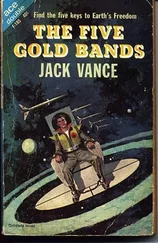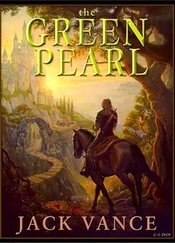He rose from the bunk, shared breakfast with Palafox who seemed to be in high spirits. Beran took sufficient courage to put a few further inquiries. “Are you actually a wizard?”
“I can perform no miracles,” said Palafox, “except perhaps those of the mind.”
“But you walk on air! You shoot fire from your finger!”
“As does any other Breakness dominie.”
Beran looked wonderingly at the long keen visage. “Then you are all wizards?”
“Bah!” exclaimed Palafox. “These powers are the result of bodily modification. I am highly modified.”
Beran’s awe became tinged with doubt. “The Mamarone are modified, but …”
Palafox grinned down at Beran like a wolf. “This is the least apt comparison. Can neutraloids walk on air?”
“No.”
“We are not neutraloids,” said Palafox decisively. “Our modifications enhance rather than eliminate our powers. Anti-gravity web is meshed into the skin of my feet. Radar in my left hand, at the back of my neck, in my forehead provides me with a sixth sense. I can see three colors below the red and four over the violet. I can hear radio waves. I can walk under water, I can float in space. Instead of bone in my forefinger, I carry a projection tube. I have a number of other powers, all drawing energy from a pack fitted into my chest.”
Beran was silent for a moment. Then he asked diffidently, “When I come to Breakness, will I be modified too?”
Palafox considered Beran as if in the light of a new idea. “If you do exactly as I say you must do.”
Beran turned his head. “What must I do?” he asked in a restrained voice.
“For the present, you need not concern yourself.”
Beran went to the port and looked out, but nothing could be seen but speed-striations of gray and black. “How long before we reach Breakness?” he asked.
“Not so very long … Come away from the port. Looking into sub-space can harm a susceptible brain.”
Indicators on the control panel vibrated and fluttered; the space-boat gave a quick lurch.
Palafox stepped up to look from the observation dome. “Here is Breakness!”
Beran, standing on his tiptoes, saw a gray world, and behind, a small white sun. The space-boat whistled down into the atmosphere, and the world grew large.
Beran glimpsed mountains enormous beyond imagination: claws of rock forty miles high trailing plumes of vapor, rimed by ice and snow. The boat slipped across a gray-green ocean, mottled by clumps of floating weed, then once more rode over the crags.
The boat, now moving slowly, dipped into a vast valley with rock-slab walls and a bottom hidden by haze and murk. Ahead a rocky slope, wide as a prairie, showed a trifle of gray-white crust. The boat approached, and the crust became a small city clinging to the shoulder of the mountain-side. The buildings were low, constructed of rock-melt with roofs of russet brown; some of them joined and hung down the crag like a chain. The effect was bleak and not at all imposing.
“Is that Breakness?” asked Beran.
“That is Breakness Institute,” said Palafox.
Beran was vaguely disappointed. “I had expected something different.”
“We make no pretensions,” Palafox remarked. “There are, after all, a very few dominie. And we see very little of each other.”
Beran started to speak, then hesitated, sensing that he was touching upon a sensitive subject. In a cautious voice he asked, “Do your sons all live with you?”
“No,” said Palafox shortly. “They attend the Institute, naturally.”
The boat sank slowly; the indicators on the control board fluttered and jumped as if alive.
Beran, looking across the chasm, remembered the verdant landscape and blue seas of his homeland with a pang. “When will I go back to Pao?” he asked in sudden anxiety.
Palafox, his mind on other matters, answered offhandedly. “As soon as conditions warrant.”
“But when will that be?”
Palafox looked swiftly down at him. “Do you want to be Panarch of Pao?”
“Yes,” said Beran decidedly. “If I could be modified.”
“Perhaps you may be granted these wishes. But you must never forget that he who gets must give.”
“What must I give?”
“We will discuss this matter later.”
“Bustamonte will not welcome me,” said Beran gloomily. “I think he wants to be Panarch too.”
Palafox laughed. “Bustamonte is having his troubles. Rejoice that Bustamonte must cope with them and not you.”
Bustamonte’s troubles were large. His dreams of grandeur were exploded. Instead of ruling the eight continents of Pao and holding court at Eiljanre, his retinue consisted of a dozen Mamarone, three of his least desirable concubines, and a dozen disgruntled officials of magisterial rank. His realm was a remote village on the rain-swept moors of Nonamand; his palace a tavern. He enjoyed these prerogatives only on the sufferance of the Brumbos who, enjoying the fruits of their conquest, felt no great urge to seek out and destroy Bustamonte.
A month passed. Bustamonte’s temper grew short. He beat the concubines, berated his followers. The shepherds of the region took to avoiding the village; the innkeeper and the villagers every day became more taciturn, until one morning Bustamonte awoke to find the village deserted, the moors desolate of flocks.
Bustamonte despatched half the neutraloids to forage for food, but they never returned. The ministers openly made plans to return to a more hospitable environment. Bustamonte argued and promised, but the Paonese mind was not easily amenable to any sort of persuasion.
Early one dreary morning the remaining neutraloids decamped. The concubines refused to bestir themselves, but sat huddled together, sniffling with head colds. All forenoon a miserable rain fell; the tavern became dank. Bustamonte ordered Est Coelho, Minister of Inter-Continental Transport, to arrange a blaze in the fireplace, but Coelho was in no mood to truckle to Bustamonte. Tempers seethed, boiled over; as a result the entire group of ministers marched forth into the rain and set out for the coastal port of Spyrianthe.
The three women stirred, looked after the ministers, then like a single creature, turned to look slyly toward Bustamonte. He was alert. At the expression on his face, they sighed and groaned.
Cursing and panting Bustamonte broke up the tavern furniture and built a roaring blaze in the fireplace.
There was a sound from outside, a faint chorus of yells, a wild Rip-rip-rip!
Bustamonte’s heart sank, his jaw sagged. This was the hunting chivvy of the Brumbos, the clan call.
The yelling and rip-rip-rip! grew keener, and finally came down the single street of the village.
Bustamonte wrapped a cloak about his stocky frame, went to the door, flung it open, stepped out upon the cobbles.
Down the road from the moors came his ministers at a staggering lope. Above, a dozen warriors of the Brumbo Clan rode air-horses, cavorting, whooping and shouting, herding the ministers like sheep. At the sight of Bustamonte they screamed in triumph, swung down, grounded their air-horses, sprang forward, each anxious to be first to lay hands on the nape of Bustamonte’s neck.
Bustamonte retreated into the doorway, resolved to die with dignity intact. He brought out his wasp, and blood would have flowed had not the Batch warriors stood back.
Down flew Eban Buzbek himself, a wiry jug-eared little man, his yellow hair plaited into a foot-long queue. The keel of his air-horse clattered along the cobbles; the tubes sighed and sputtered.
Eban Buzbek marched forward, pushed through the sobbing huddle of ministers, reached to seize Bustamonte by the nape and force him to his knees. Bustamonte backed further into the doorway, pointed his wasp. But the Brumbo warriors were quick; their shock-pistols bellowed; Bustamonte was buffeted against the wall. Eban Buzbek seized him by the neck and hurled him into the mud of the street.
Читать дальше
